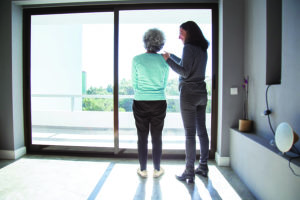by Julie Randolph, Care Coordinator
 If you or your loved one have been diagnosed with Alzheimer’s disease or dementia, we would love to join in your journey and walk alongside to provide supports. Support may be needed short-term or long-term, and needs may come and go.
If you or your loved one have been diagnosed with Alzheimer’s disease or dementia, we would love to join in your journey and walk alongside to provide supports. Support may be needed short-term or long-term, and needs may come and go.
We encourage you to plan interventions for unforeseen emergencies. An emergency plan is invaluable when crises occur. Gather your friends and family to develop and write out a plan of action to be implemented at the time of sudden hospitalization, death, or disability. Consider having a list of phone numbers of those who need notification. Assign someone to pay the bills by providing passwords and access to valuable information such as insurance policies. Assign someone to care for the pets, plants, lawn care, and household chores. Ultimately, designate a person who will care for your loved one with Alzheimer’s disease if the caregiver is no longer available.
Empower yourself with educational classes, support groups, and conversations with your doctor and support staff. Consider counseling to build your coping skills and mindfulness techniques to use in stressful situations. Support your well-being by prioritizing preventive health care exams, regular exercise, a balanced diet, and financial advice.
The path each person and caregiver take during the progression through the stages of dementia varies, but at some point, some find they need and want more supports. Pre-planning and making connections can make all the difference.
The Alzheimer’s Association 24 hour Helpline at 1-800-272-3900 provides a master’s level Care Consultant providing confidential decision-making support, education, and crisis assistance.
Senior Services provides a variety of supports and services to take advantage of now and in the future. Check out this month’s class for care partners, Effective Communication Tips for Caregivers, on Wednesday, September 8 at 2-4 pm, located at Trailside Activity & Dining Center, 4700 Dublin Avenue in Midland. Billie Ritter RN, Health Education Coordinator and Trena Winans, Director of Education and Outreach, will explain the challenges that exist and why, in addition to practical tools to enhance connections.
You do not need to walk this path alone. Please reach out to Senior Services at 989-633-3700, and we will assist you by building a care plan that is supportive to you.

